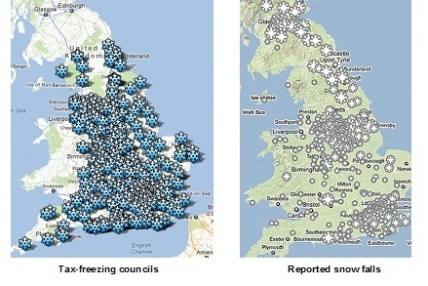Chris Game
Even allowing for all the undecideds and the “ooh-I’ve-not-heard-anything-about-it”s, opinion polls suggest that several, perhaps even most, of the ten referendums on May 3rd could produce Yes majorities for elected mayors. None suggest, though, that there isn’t everything still to play for. Why, then, are Government Ministers, who claim to want this potentially momentous change, making life so difficult for the Yes campaigners?
Two issues come up at every mayoral meeting: What additional ‘hard’ powers would a mayor in my city have? and How do we kick out one who’s no good? With the Localism Act offering little help, and Ministers even less, this blog attempts to provide some at least partial answers.
Powers were intended to be easy. In the original Bill, undefined additional powers – transferred ‘local public service functions’ – would go to mayoral authorities only. They were the bribe to get us to vote for the mayors that only false consciousness had prevented us realising we really wanted all along.
But the Lords crucially amended this bit of the Bill, enabling functions to be transferred to any ‘permitted authority’, provided the transfer “would promote economic development … or increase local accountability”. The mayoral bribe had gone – replaced only by a thinly disguised code.
December’s Cabinet Office prospectus, Unlocking Growth in Cities, stated that cities wanting significant new powers and funding would “need to demonstrate strong, visible and accountable leadership and effective decision-making structures” –universally interpreted as having an elected mayor.
This document launched the Government’s policy of ‘City Deals’ – bespoke packages of new powers, projects and funding sources, negotiated with the leaders of individual cities, in exchange for an agreement to work with the Government, the private sector and other agencies to unlock these cities’ “full growth potential”.
It sounds encouragingly localist – until you realise the Catch-22. Ministers want to negotiate individual city deals with elected mayors; they can’t say what any specific deal will comprise without knowing who they’ll be negotiating with; but voters, unless they know the likely content of their deal, are much less likely to opt for mayors.
Though inconvenient, this logic might just be acceptable, had Ministers themselves not completely ignored it in publicising early deals with one city still to elect a mayor and another outspokenly opposed to the whole idea.
Ministers could yet decide, as was hinted at before the Budget, to reveal some meaningful detail about the discussions already held with the leaderships of other referendum cities, but it now seems unlikely. Yes campaigners, therefore, must make the most of the Liverpool and Greater Manchester deals that we do know about – by no means, as it turns out, too discouraging a task.
Liverpool’s city deal was announced on February 7th – the same day as the Labour Council, bypassing its electorate, took the decision itself to have an elected mayor who, once elected on May 3rd, would lead its implementation.
All involved insisted, however, that the deal was not dependent on the city having a mayor – which means that any city whose electors have actually voted for a mayor will surely expect to negotiate a deal worth proportionately at least as much as Liverpool’s.
Liverpool Council’s website headlines the deal’s additional economic development money as initially £130 million – “including £75 million of new money from government” – with the potential to grow to between £500 million and £1 billion.
Other goodies include: an Environmental Technology Zone, with the resulting growth in business rate income going to the Local Enterprise Partnership (LEP) and five Mayoral Development Zones; a Mayoral Investment Board to oversee the city’s economic and housing strategy; and a Secondary School Investment Plan to build 12 new secondary schools.
Sceptics will, entirely reasonably, note the big questions here barely even addressed. How much of all of this is genuinely new money, as opposed to money that would have come to Liverpool anyway from existing or abolished funding sources? How much of this city deal has to be shared with the city-region LEP? How much freedom of action will the Mayor have to do things that Ministers don’t like? And, of course, the perennial question of additional revenue-raising, as opposed to capital-raising, powers.
However, even to Kenny Dalglish and Liverpool FC, £500 million-plus is hardly loose change. Moreover, most of what relatively little criticism there has been of the package came, significantly, only after the announcement of Greater Manchester’s deal, whose ‘earn back’ tax provision – the first allowing local government to take directly a slice of national taxes – was rightly acknowledged as a genuinely ground-breaking policy innovation.
Importantly, Manchester’s is not a deal with the City Council, but with the Greater Manchester Combined Authority (GMCA) – the strategic authority for all ten Manchester boroughs, whose statutory city region status is clearly accepted by Ministers as having at least the strength and accountability of a city mayor.
Under the deal the GMCA will invest £1.2 billion in infrastructure to promote economic growth, and – the headline bit – will be able to earn back up to £30 million of the extra growth-generated tax revenues to reinvest in a revolving infrastructure fund, in which the money is returned on a payment-by-results basis.
The whole deal aims to create and protect a total of over 6,000 jobs, with other provisions – including devolution of the Northern Rail franchise, 6,000 more apprenticeships, a low carbon hub, and up to 7,000 new homes through a Housing Investment Board – detailed on the DCLG website.
Its total potential impact on the city and regional economy is huge, and, exceptional as the GMCA may be, this publicised deal has to be seen as a massive precedent, and, surely, a major addition to the Yes campaigners’ armoury.
Removal of mayors should also have been settled by now. In its Impact Assessment in January 2011, the Government asserted (p.9) that, if mayors were going to exercise additional powers and freedoms, the accountability regime should include a recall mechanism – to be introduced “at a later date … having considered the issue alongside proposals for recall for other public officials.”
It would have been useful had Ministers reminded voters of this pledge and given some vague hint of when the “later date” might arrive. Still, it remains Government policy, and the answer, therefore, to the question: “If we’re going to directly elect a mayor, how can we directly unelect a rubbish one?” is that, by the time the possibility arises, some recall mechanism should, as promised, be in place.
But what kind of mechanism? The Warwick Commission Report on Elected Mayors seems to suggest that “an appropriate recall process”, enabling the removal of a mayor “in extremis”, might be one exercised through a no confidence vote by the full council (pp. 10,34). Which is not dissimilar to the Government’s current attempt to introduce a recall mechanism for MPs, controlled by other MPs, rather than by voters – and rapidly unravelling as a consequence, which probably explains why Ministers are keeping so stum about recall for mayors.
In what is supposed to be a major extension of direct democracy, “an appropriate recall process” would seem logically to be one in which voters are the key players. A set percentage of a disgruntled electorate sign a petition, and thereby trigger a recall vote in which those same electors are asked if they want their mayor to be recalled, with a Yes vote triggering in turn a by-election.
Finally, there is the in extremis issue. The Recall of Elected Representatives Bill – the one introduced, regrettably, not by the Government, but as a Private Member’s Bill by Conservative MP, Zac Goldsmith – proposes that recall should kick into action not in extremis, but in any circumstances in which representatives lose the confidence of their electorate: if, say, they’ve acted financially dishonestly or disreputably, intentionally misled the body to which they’ve been elected, broken promises made in an election address, or behaved in a way likely to bring their office into disrepute (Clause 1(2b).
It’s almost certainly not what Ministers have in mind, but I bet it wouldn’t half boost the Yes vote on May 3rd and maybe even the turnout.
Chris is a Visiting Lecturer at INLOGOV interested in the politics of local government; local elections, electoral reform and other electoral behaviour; party politics; political leadership and management; member-officer relations; central-local relations; use of consumer and opinion research in local government; the modernisation agenda and the implementation of executive local government.




